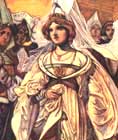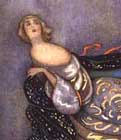
Cinderella:
345 Variants
by Marian
Roalfe Cox
SurLaLune's
Cinderella Area
SurLaLune Fairy Tales Main Page
202
Waldau, A., Bohmisches Märchenbuch. Prague, 1860. Pp. 502-518. (Translated from the original of Bozena Nemcova.)
THE PRINCESS WITH THE GOLD STAR ON HER BROW."
ABSTRACT
Death-bed promise--Deceased wife resemblance marriage test--Unnatural father -- Countertasks-- Magic dresses- Mother help in dream--Heroine disguise (mouse-skin dress). Veil from mother renders her invisible--Heroine flight--Dresses hidden under stone; fish to guard them--Menial heroine (kitchenmaid), called "Mouse-skin"--Meeting-place (ball)--Threefold flight-- Lovesick prince--Recognition food (contains ring given at third ball)--Prince suspects kitchen-maid, makes hole in wall of bath house to spy -- Heroine discovered--Happy marriage--Cook rewarded for kindness to heroine--Penitent father, to whom dead wife has appeared in dream, rejoices to find lost daughter.
TABULATION
(1) Lovely queen, with gold star on brow, dies when heroine is born. King, whose grief is excessive, will not look on child, who is very beautiful, the picture of her mother, and called Lada, because she is so charming. After several years the king is counselled to marry again. But he has promised his deceased wife that he will only marry someone exactly resembling her, he sets out with large retinue, and travels through the world in search of such a one, but can find none with gold star on brow.-- (2) On his return, daughter rushes to meet him; he sees the image of his wife with the star on her brow, and he tells his daughter he must marry her.-- (3) She is shocked, but treats the matter as a joke, and says, "Yes, she will marry him if he gives her first a dress made of the wings of golden-crested wrens." This is procured for a large sum of gold; then she asks successively fur a dress like the sun, and a dress like the sky covered with stars. These are both provided, and huge diamonds take the place of stars. Lada is in despair.-- (4) That night her mother appears to her in a dream, makes known who she is, and gives her a white veil woven of mist, which will render her invisible,1 then bids her provide herself a poor dress, and escape. Heroine wakes her maid early, and bids her procure for her a cloak of mouse-skins that shall cover her from head to foot. In three days the wedding is to take place.-- (5) Heroine dons the mouse-skin cloak, makes a bundle of her three dresses, and, with a kerchief and the veil on her head, she wanders forth, till at length she reaches a town where there is a royal palace. She resolves to seek service here. There is a grove hard by with a little stream. Heroine raises a Stone, and hides her bundle and veil under it. A fish in the stream sees her, and she says, "Don't you tell anyone, little fish, but guard it well." On the way to the palace she soils her face with ashes, knits her brow, and draws the kerchief down further over it. The servants laugh at her appearance in the mouse-skin cloak, but at length the cook takes compassion on her, and engages her as kitchen-maid on condition that she keeps out of sight of the gentry. They call her "Little Mouse-skins".-- (6) King has an only son named Hostivit, whom he would fain see married. Heroine hears him so much belauded that she is glad when he one day passes by the kitchen, and she rushes out to look at him. There is a three days feast to celebrate king's birthday, Heroine begs cook to let her get a glimpse of the guests from some corner or other, and at last obtains consent, She runs to the stone, washes in the stream, dons feather-dress, then, with veil over her head, she goes unseen to ball-room, When she takes this off all wonder at her beauty, prince dances with her, and asks who she is and whence she comes. She replies, if he cares to see her he had better not know who she is. She leaves at daybreak, promising to come next evening, then returns dress to stone, speaks again to fish, who is looking on, and is back at her place without servants seeing her enter.-- (7) Every morning the prince's valet has brought word what prince wishes for breakfast, but this morning he does not care what they give him, he is in such high spirits. Cook says prince must have fallen in love with some princess at the ball, and heroine hears and blushes.-- (8) She goes next night to ball in sundress, dances with prince, and stays later than before, and everyone is astir when she returns to her work. Cook is angry, and says she shall never go anywhere again, but afterwards relents. Prince's valet says prince will eat nothing, and is as quiet as the grave,-- (9) Next night heroine appears at ball in star-dress. Prince's face lights up when he sees her, but they are both too sad to dance, and sit apart talking. Prince wishes to marry her, but she cannot grant his request, though she gives him her ring as pledge of her love, and he gives his in exchange. She tells him that whoever brings his ring to him is a trusty messenger, who will arrange a meeting between them. Then she leaves him sorrowing. Heroine hides betrothal ring in her bosom, and returns with heavy heart to kitchen.-- (10) She finds a great commotion there, and asks cause. Cook says, does she not know that prince is sick unto death? Cook does not know which way to turn. A servant rushes in with some remedy, which is to be cooked at once for the prince.-- (11) Heroine snatches it from his hand, puts it on the fire, as soon as it is ready pours the healing draught into a jug, and is about to carry it up. Cook says, what does she mean by going to prince in that skin? Heroine says, it is all right, he shall not see her, she will give it to valet. On the way she drops in the ring. When prince finds it he sends for cook, and afterwards for kitchen-maid who resists, and has to be dragged in. She bows her head so as not to be seen. Prince questions her, and she says she prepared the draught, but knows nothing about ring, Then she goes; but prince has been struck with her noble bearing, in spite of ugly skin-dress, and has noticed her small feet, and contrives how he may, unseen by her, watch her.-- (12) It is the custom of the place for all, rich and poor, to bathe a great deal, and for this purpose there are two large baths in the palace-garden one for the servants, the other for the royal family. Prince goes secretly and bores a hole in the wall of the women's bath-house, then returns to his room. Doctors are amazed to see him so miraculously restored to health. That night he steals out to the garden, goes to bath-house, and hides among the shrubs, Kitchen- maid is the last to come and bathe. Prince watches at the hole. She takes off skin, then the kerchief and washes her face. The star gleams on her brow; prince can restrain himself no longer. "Lada, my Lada!" he cries, and rushes from his hiding-place. Heroine, alarmed, for she knows his voice, throws on the skin and kerchief, and rushes out. But he meets her in the doorway, folds her in his arms, and kisses her, Then he says he will take her to his father; but she will not go thus clad, and bids him wait.-- (13) She goes to stone and finds her bundle, but the veil is missing, and the little guardian is not there. But she does not mind now, and hurries back to dressing-room, where she dons a royal garb. Then prince takes her before his father, and for the first time she tells her parentage.-- (14) Cook is storming in the kitchen because kitchen-maid is so long away. Suddenly a servant comes to tell him prince has sent for him. Cook appears before prince and his lovely future bride. "Why have you had in the kitchen such an ugly, smutty maid?" asks the prince. Cook is alarmed, and says he would not take her at first, only she pleaded so hard; and he has never had a more faithful or useful person in his kitchen, and her only fault is that she will wear that mouse-skin, and smear her face with ashes. "Your blame is just, and I am grateful for your praise and for your kindly taking me. Your kitchen-maid will reward you," says Lada, and he falls at her feet. She gives him a purse of gold.-- (15) The wedding over, heroine drives with bridegroom to palace of her father, whom she fears to meet. But the night she escaped from him his dead wife appeared to him in a dream, and convinced him of his evil purpose, since when he has sought his lost daughter in vain. They all rejoice together.
NOTES
Note 67
(P. 458.) In No. 335 the hero has the power to become invisible. With the invisible veil compare the tarnkappe, the nebelkappe of King Alberich, the wishing-cap of Fortunatus, Perseus' cap, the ring of Gyges (Plato, Repub., 359, 360), the ring which makes Discordia invisible (Troj., 1303-24), Pluto's or Orcus's helmet ([Greek name], Il., 5, 845; Hesiod, Scut., 227), and the mantle of Arthur and the ring of Luned, which were reckoned amongst the thirteen precious things of the Island of Britain (Mabinogion, p. 286). Other things which make invisible are an adder's crown (Atternkronlein, Grimm, T. M., 687); a bird's nest (Deutsche Sagen, No. 85; Haupt, Zeitschrift, 3, 361; Mone, Anz., 8, 539); the right-hand tail-feather of a cock (Luciani Somn., 28-9); the finger-ring of Dame Aventiure (Suchenwirth, No. xxv); heliotrope,A Sonnenwedel, laid under a stone (Mone, 8, 614); and fern-seed (Wolf, Zeitschrift, 2, 30). So Shakespeare says, "We have the receipt of fern-seed, we walk invisible" (I Henry IV, ii, 1). The Wend. volkst., 2, 271a, makes it blossom at Midsummer noon. In Redeker's Westf. Sagen, No. 46, other details are given: "Fern-seed makes one invisible; it is difficult to procure; it ripens only between twelve and one on Midsummer night, and falls off directly and is gone." Mr. Fraser says: "Fern-bloom on Midsummer Eve makes invisible" (Golden Bough, ii, 287), and gives a number of references. According to Mr. Ralston (see Songs of the Russian People, p. 98), the ideas associated with the fern in other lands are current also in Russia. At certain periods of the year it bursts into fiery blossoms, which disappear almost instantaneously, for evil spirits swarm thickly round them and carry them off. He tells the best way to obtain them, but the particulars are too lengthy to quote. These magic blossoms appear on St. John's Day at Midsummer, as well as on Easter Day (Athanas'ev, P. V. S., ii, 379). A number of similar traditions about the fern, from German sources, will be found in Kelly's Curiosities of Judo-European Tradition and Folk-lore, pp. 181, 200.
Gods can appear and vanish as they please (see note 6). For gods becoming visible Homer has a special word, [Greek name], Il. 20, 131; and see Od. 7, 201; 16, 161. Comp. [Greek name], Lucian's Sat., 10); and against their will they can be seen of none (Od., 10, 573). Dwarfs and men, to become invisible, need some outward means. The dwarf-tales tell of nebelkappen (Deutsche Sagen, Nos. 152, 153, 155), of grey coats and red caps (Thiele, i, 122, 135), and of scarlet cloaks (Deutsche Sagen, No. 149). Compare the huldre-hat (Asbjornsen, 1, 70, 158-59). Grimm gives a spell (No. LI) to make oneself invisible, part of which says, "Christus ist mein Mantel, Rock, Stock und Fuss, seine heilige funf Wunden mich verbergen thun."
For examples in folk-tales of various gear to render the wearer invisible, see the following: Asbjornsen, 1, 70, 158-59; Am. F.-L. Journal, i, 76 (cap); Arnason, p. 397; Busk, F.-L. R., pp. 129-30; Clouston, Pop. Tales and Fictions, i, 72 ff. Cosquin, ii, 80, 256; Crane, pp. 1, 23; Dasent, p. 181, "Three Princesses of Whiteland"; F.-L. .Rec., i, 211; ii, 10, 13; Frere O. D. D., p. 39 ff.; Grimm, Deut. S., No. 85 (flower); Kathasaritsagara, story of King Mahásena, and story of King Putraka; Mabinogion, p. 13; Melusine, 1876, c. 17 ff., "Le Voleur avise"; Mitford, Tales of Old Japan, "Little Peachling"; Morolt, 1305 (magic ring with nightingale in it); Pedroso, Port. Tales, 'Dancing Shoes"; Ralston, R. F. T., p.253; and Songs of the Russian People, p. 98; Sagas from Far East, p. 18, "Gold-spitting Prince"; Schreck, Finnische Marchen, No. 3; Stokes, No. 21, pp. 59, 138; Symington, Pen and Pencil Sketches of Faroe and Iceland, p. 247 (stone); Thorpe, p. 342, "Svend'sExploits" (finger-stall); Tuscan Fairy Tales, No. 10, pp. 102-12; Vernaleken, pp. 153 (cap), 289, and 355 (cloak); Wide-Awake Stories, p. 37 ff.
A: According to
Pliny, it was the precious stone heliotrope that would render the wearer
invisible (see H. N., xxxvii, 10, 60); compare "Senza sperar
pertugio o elitropia", Inferno, xxiv, 93.
Return to place in note.
Cox, Marian Roalfe. Cinderella: Three Hundred and Forty-five Variants of Cinderella, Catskin, and Cap O' Rushes, abstracted and tabulated. London: David Nutt for the Folklore Society, 1893.
While the original text of this book is out of copyright, the special formatting and compilation available on SurLaLune Fairy Tales is copyrighted. Be aware that while the original content has been honored, page numbering, footnote numbering, redesigned charts, links, and other aspects are unique to this site's version of the text. Use at your own risk. For private and fair use educational purposes only.
©Heidi
Anne Heiner, SurLaLune Fairy Tales
E-mail: surlalune@aol.com
Page last updated February 1, 2006
www.surlalunefairytales.com










